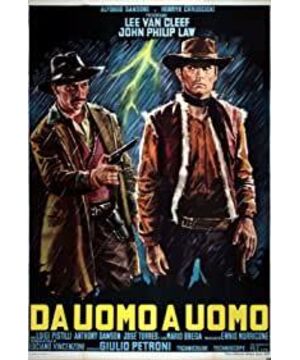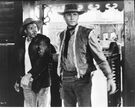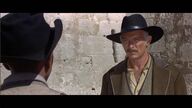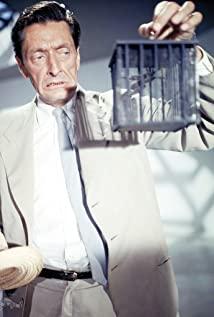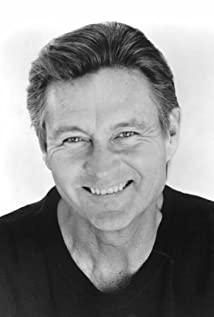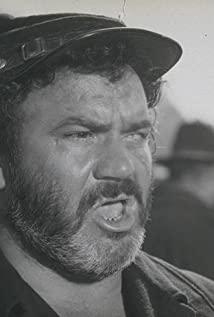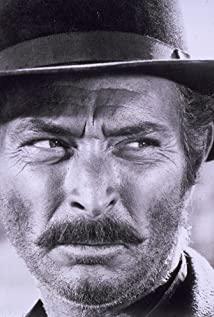Death Rides a Horse, Death Rides a Horse. Da Uomo a Uomo, From Man to Man. From the beginning, the Clint Eastwood male god entered the Western movie pit, but when he saw Lee Van Cleef, he ran away and turned into a movie focusing on Van Cleef. This movie is a surprise. I didn't feel amazing when I first watched it, but I was very impressed with the soundtrack by Master Morricone. I found the background music and listened to it repeatedly for a few days, and by the way, I recalled the plot. After thinking about it for a while, the more I think about it, the more exciting it becomes.
The four old western movies starred by Mr. Van Cleef that I have seen so far, Death Rides a Horse, Day of Angry, Beyond the Law, and the famous For a Few Dollars More. Needless to say, the status of "Double Guys", the rest of the films, with old and new themes themselves, are very attractive. But in terms of personal feelings, "Death on Horseback" touched me the most. Among the tough western movies, there are not many emotional handling so delicate like this one. Compared with Double Dead, this movie is much rougher from the screen to the plot, but on the other hand, it also conforms to the rough style of the entire movie. Thanks in large part to the soundtrack by Master Morricone. Morricone is good at using music to describe the characters of the characters in the film. Listening to each person's theme melody is like meeting the person. There is no free and easy role like Dongmu in the Red Dead trilogy in this film, and Van Cleef is not meticulous in suits and leather. The killer in black is a full-fledged western cowboy, so the overall soundtrack is different from the impression given by Red Dead. I've even heard people say that the soundtrack of Reaper sounds like Taoist music, joking of course. When I first heard the theme music of Death Riding on a Horse, I thought it was weird, but in the harsh and vast geographic background of the West and the background of repressed revenge throughout, the eccentric but sonorous rhythm and tone were awe-inspiring . There is no well-designed multi-timbral coordination, no relaxed and pleasant minor, no iron man tenderness, only the sound of hooves, cold wind, difficult patience, and the moment of life and death. In the part of the vocal chorus, I have a single loop for a long time. There is no gorgeous accompaniment, no beautiful tune, and the same simple and simple singing. Only this kind of music is worthy of the open west and heavy music. Themes and heavy emotions. Although it is completely different from my previous impression of Morricone's music style, the music that fits the plot and the heart is undoubtedly a master style.
Lee Van Cleef's character is a seasoned old gunslinger. I don't need to say more about this great actor, but here's a few words about John Phillip Law. The young gunslinger Bill has a very good image. He's not the young, cunning, skilful, invulnerable ace of Eastwood, nor the brilliant but pure-hearted, inexperienced Scott Mary of Day of Angry. When he was a child, he witnessed the tragic death of his family. He practiced his marksmanship for many years without any interference. He vowed revenge. From the beginning, he was a much deeper boy than his peers. In terms of strategy and experience, the role of this role is well grasped. He possesses unique skills, and he has the omen of a generation of spear kings when he is just starting out, and he is smart and decisive. He will not scare the audience to death like a complete rookie, but he will not be inexplicably scheming like a master Dongmu before he has seen anything. ,Invincible. That's why he made a mistake, was caught by his opponent, was buried alive, and was rescued by an old gunman. But it's still a very clever character, single-handedly taking revenge and saving Ryan from jail, no ambiguity. He and Scott Mary in Day of Angry have a scene chasing Van Cleef, but the two roles are very different. Scott Mary put all her hopes on the old gunman, was pointed at the gun, and believed everything. And the young protagonist's answer when Ryan refused his request was a confident smile and a sentence "You'll have to shoot me": don't want me to go unless you give me a shot.
I personally have a not-so-noble thought about Ryan's choice to drop the last bullet in the end. Maybe the seasoned Ryan knew that if he gave up his self-defense and completely gave up self-defense, he would not be able to kill with this young man's temper. If he really used that bullet, he would be able to kill Ryan in a duel. But it's also possible that I'm overthinking it. After all, in the previous episodes, the feelings of the new and old gunmen have been well laid out.
There are two scenes that remind me a little bit of tears. One is Ryan, who has just been released from prison shortly after the opening, standing in front of the three graves in Bill's yard and asks if these are your parents, and Bill calmly replies: "That's my whole family." The second is that Bill took away He took Ryan's horse, and used the way of man to return the old gunman who was unarmed (except for the razor) in the barren hills alone, and wanted to take revenge alone. Ryan stopped him and said, "I wish I had a son like you, because one day I'm going to be hit by a bullet flying from my back... ah well, let's go." The young gunman didn't answer, and pulled the pistol And the bullet threw it on the ground and said, "You might need it." Both scenes used my favorite vocal chorus BGM. Perhaps this is the emotional essence of "Death on Horseback". To the west is life, and to the west there is love. Two hard-hearted men, one old and one young, have crossed fate because of hatred, and they have proved everything with silence time and time again. Language is powerless in the face of such heavy feelings, and some only have a vast state of mind like the wild west.
View more about Death Rides a Horse reviews


